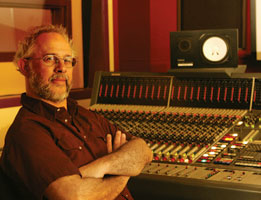|
|
Be Prepared |
July 2007 |
|
I was a Cub Scout dropout, so I can't credit the Boy Scouts' ĺ─˙Be preparedĺ─¨ motto with my penchant for planning. I learned about preparation during my years on the road, where one is vulnerable to anything and everything. In such an environment, if you aren't ready for trouble, you are sure to find it.
If you want to produce music, ĺ─˙Be preparedĺ─¨ applies big-time. If you are so eager to get on with tracking and mixing that you rush through the planning phases, you are asking for trouble.
A few months ago, Senior Editor Gino Robair and I started planning an article on how to avoid or fix many problems that occur with mixing. EM contributor Michael Cooper was our first choice to write the story for many reasons, among them the fact that he often mixes tracks that his clients have recorded themselves, and masters projects that were mixed by others. In doing so, he has developed a good understanding of the ways that musicians tend to mess up their mixes. Drawing on his wealth of experience, Cooper has delivered a first-rate story on solving ĺ─ţ and avoiding ĺ─ţ common mixing errors (see ĺ─˙Twelve Common Mixing Mistakesĺ─¨ on p. 36).
The deeper that one delves into the problems Cooper has identified, the clearer it becomes that fixing them in the mix is an undesirable solution. It makes a lot more sense to prepare properly and heed Cooper's advice in order to avoid these problems to begin with.
Similarly, EM readers and others have often bent my ear about their dissatisfaction with their studios. Perhaps their room doesn't sound right, they don't trust their cables, or their gear is inconveniently arranged. If you are unhappy with your studio, you are unlikely to be fully productive. In many cases, trouble arose because the studio owners didn't prepare their plans carefully before beginning construction; they just started building.
When author Nick Peck relocated his studio, he was faced with several challenges. The new space was significantly different from the old, and some of the nature of his work had changed. He needed to reexamine his goals and rethink his studio setup. This planning process inspired and informed his article ĺ─˙Starting Overĺ─¨ (see p. 29).
The lessons that Cooper's and Peck's stories have in common may seem obvious, but enough people mess up their mixes and studio setups that a few of these lessons are worth highlighting. A crucial point is to be clear about your goals and keep them in mind when making decisions. With the goals established, take the time to thoroughly plan your project before you begin implementing it. If you plan well and employ some elbow grease, you can do a lot on a modest budget. Don't take the fastest solution just because it's quick and easy; make sure it's the right one for your purpose. And remember, it's not about having the sexiest gear; it's about having the appropriate gear for the job.
Whether you are building a mix or a studio, be prepared for the unexpected, because studio construction and mixing rarely go exactly as planned. And that's the simple truth ĺ─ţ scout's honor! |
